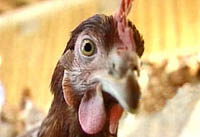Bird flu virus breaks out in Moscow region, poses lethal danger to humans
The H5N1 avian flu virus detected in the Moscow region potentially poses a lethal danger to humans, Russian news agencies report with reference to the chairman of the Vet Control Service of Russia, Nikolai Vlasov. Specialists start vaccinating domestic birds in the region on Monday. Over a million doses of vaccine have been prepared for the operation. Acting governor of the Moscow region, Aleksei Panteleyev, said that bird flu outbreaks had been registered in five districts of the Moscow region. “In all of the cases people purchased birds at the Moscow bird and animal market for their own farms,” the official said.

There are over 30 poultry farms in the Moscow region presently. If the virus continues to spread, all the birds at the farms will have to be culled. This may lead to the serious shortage of poultry on the local market.
The presence of H5N1, confirmed by tests late Saturday, was the first such outbreak to be recorded so close to the Russian capital.
The Moscow bird and animal market was closed Saturday, as experts were trying to determine the original source for the birds on sale there, the AP reports.
The Moscow region's chief veterinarian, Olga Gavrilenko, told Ekho Moskvy radio on Sunday that dead domestic birds had been reported in the northern Taldom district.
Officials said several people who were in close contact the dead poultry were taken in for medical observation, but no health problems had been reported.
Russian television broadcast footage showing veterinary workers clad in protective suits checking homes in one district and spraying vehicle tires with disinfectant, while police began enforcing a quarantine in an effort to prevent the virus' spread.
Nikolai Vlasov, a senior Rosselkhoznadzor veterinary official, warned that more outbreaks were possible.
"If traces of the virus appear at the poultry market, we cannot exclude the possibility that there will be new outbreaks. But there should be no panic because conditions in Russia, especially in the winter, mean that there is not even any theoretical possibility of human infection," Vlasov said in televised comments.
No human cases of bird flu have been reported in Russia, which had its first reported cases of the H5N1 strain in Siberia in 2005. Outbreaks have since occurred farther west, but mostly in southern areas distant from the capital, the AP reports.
Bird flu cases were registered in 93 towns or settlements in Siberia and southern Russia last year, according to the RIA-Novosti news agency. The country's first outbreak this year was registered last month in the Krasnodar territory, an agricultural region near the Black Sea.
Since it began ravaging Asian poultry farms in late 2003, the H5N1 strain has killed at least 167 people worldwide, according to the World Health Organization.
Though it remains difficult for humans to catch, health authorities across the globe are monitoring the H5N1 strain out of concern it could mutate into a form that easily spreads from person to person and spark a pandemic.
Subscribe to Pravda.Ru Telegram channel, Facebook, RSS!




